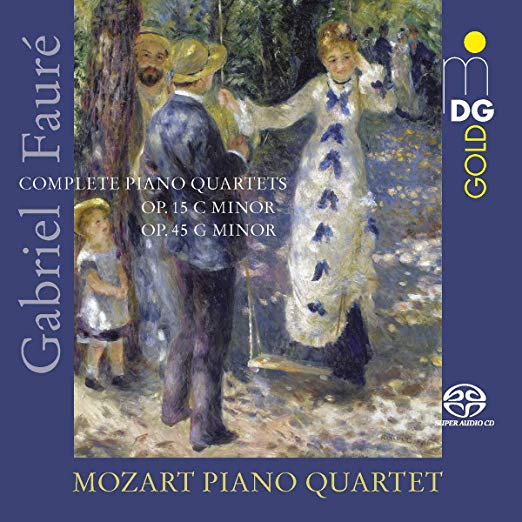
ESSENTIAL RECORDINGS

One thing that always strikes me when listening to French chamber music is its highly evolved sense of motion. There's always, especially in the outer movements, a tremendous level of internal activity bestowed upon either one instrument or all of them simultaneously. And it's not motion just for the sake of movement, but an actual urge or nervous tension that is part and fabric of its expressive mien. And this element is strongly present within the chamber music of Gabriel Fauré (1845-1924). For example, the first two movements of his Piano Quartet No. 2 in G minor, Op. 45 are bustling with forward momentum from start to finish -- something the members of the Mozart Piano Quartet capture and project very well -- which lends the gently melancholic mood of the following Adagio movement a deeper contrast and shift in expression. But even in this slow movement where the viola, violin and cello in turn carry the leading melody, Gabriel Fauré instructs the piano to support everything with a gentle forward flow that wards off stagnation.
The booklet notes point out the fact that French culture near the end of the 19th century was following with interest developments in opera and German symphonic works more than anything else, and therefore the composers of the day were reluctant to publish chamber works in fear that they would never get performed in public. Camille Saint-Saëns changed all that when he established the Société nationale de musique in 1871, to promote the performance of such works by up and coming composers. Up until then Gabriel Fauré had not planned on writing any chamber music but this new development encouraged him to get to work immediately and amongst other pieces finished work on his Piano Quartet No. 1 in C minor, Op. 15 in 1879. Another mandate of the Société nationale de musique was to promulgate the advancement of French culture and style, and embed it within music and promote a new national identity. And composers like Fauré were more than happy to oblige. The Scherzo movement in particular of the Op. 15 is a fine example of the new direction in which French music was heading to distinguish itself from others.
The Mozart Piano Quartet was established in 2000 and have been recording with MDG since 2004, and some of these recordings have been presented with awards and special mentions. As any good ensemble should, they seek and expose what lies at the core of a work by expressing more than what lies on the printed page. And for those of you keen on details or interested in such things, the three string instruments of the ensemble use Passione gut strings by Pirastro on this recording.
Jean-Yves Duperron - June 2019